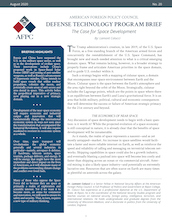
The Case for Space Development
Any discussion of space development needs to begin with a basic question: is it worth it?

Any discussion of space development needs to begin with a basic question: is it worth it?
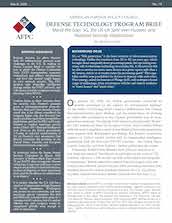
Britain’s decision to allow Huawei built 5G infrastructure presents acute challenges to the U.S.
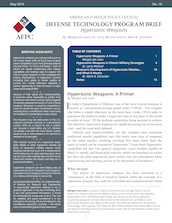
Hypersonic weapons are coming online just as the United States shifts its focus back to great power competition as its most pressing national security threat.

In the Spring of 2017, the management of the Broadcasting Board of Governors (BBG), the U.S. government’s official coordinating body for international media, approached the American Foreign Policy Council with a request. In response to persistent criticism from lawmakers on Capitol Hill, as well as mounting pressure from the newly-inaugurated Trump administration, the agency sought to commission an independent review of the content of its Persian-language media outreach. Such a process, BBG professionals explained, would help the agency to identify and rectify significant deficiencies at a time when the role of U.S. broadcasting toward the Islamic Republic was a topic of growing scrutiny (and skepticism) among those formulating the country’s strategy toward Iran...
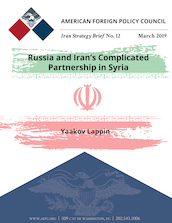
In 2015, Russia formally entered the Syrian conflict, becoming the Assad regime’s second sponsor, alongside Iran. The grounds for that intervention, we now know, were laid at a 2015 meeting between Russia’s Foreign Minister, Sergey Lavrov, and Iranian Supreme Leader Ayatollah Khamenei.
As Central Asians seek to design structures of cooperation that fit their needs, they should certainly build on the achievements of the late 1990s.
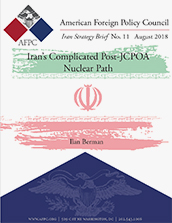
In the aftermath of President Donald Trump’s May 8th decision to formally end America’s participation in the 2015 nuclear deal known as the Joint Comprehensive Plan of Action (JCPOA), there has been significant speculation about potential responses on the part of the Iranian leadership.
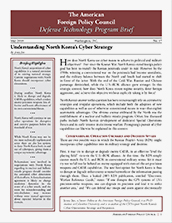
How does North Korea use cyber means to achieve its political and military objectives? Ever since the Korean War, North Korea’s stated foreign policy goal has been to reunify the Korean peninsula under its rule.
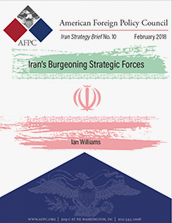
Among the Islamic Republic of Iran’s central strategic goals are the preservation of its political regime and its ascension to what it views as its rightful place as the regional hegemon of the Middle East.
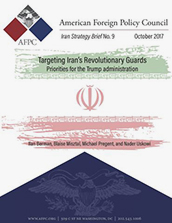
The passage this summer of the Countering America’s Adversaries Through Sanctions Act, a wide-ranging legislative package that imposed new economic pressure on Russia, Iran and North Korea, reignited the debate over U.S. policy toward the Islamic Republic.
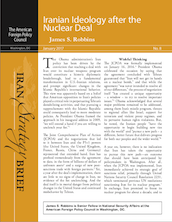
The Obama administration’s Iran policy has been driven by the conviction that reaching a deal with Iran over its nuclear weapons program would constitute a historic diplomatic breakthrough, lead to a fundamental transformation in U.S.-Iranian relations, and prompt significant changes in the Islamic Republic’s international behavior.
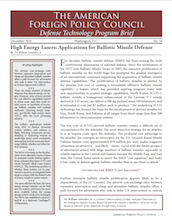
For decades, ballistic missile defense (BMD) has been among the most controversial dimensions of national defense.
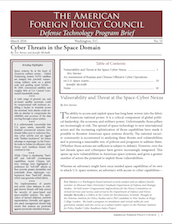
The ability to access and exploit space has long been woven into the fabric of American national power. It is a critical component of global political leadership, the economy, and military power. Unfortunately, those pillars are increasingly at risk. The spread of space technology to new international actors and the increasing sophistication of those capabilities have made it possible to threaten American space systems directly. The national security community is accustomed to analyzing these threats and vulnerabilities and is pursuing a reasonable mix of policies and programs to address them. (Whether those actions are sufficient is subject to debate). However, over the last decade space and cyberspace have grown increasingly integrated. This opens up new vulnerabilities in American space systems, and gives a greater number of actors the potential to exploit those vulnerabilities...

What is the role of cybersecurity in the conduct of war and ongoing security operations? Policymakers, academics, and journalists often think of cybersecurity as a single domain problem. That is to say, they view cyber operations as taking place solely within its own domain—one that is separate from land, sea, air or space. This perspective, however, overlooks the fact that computer systems and networks pervade society and the physical environment, and are present to some degree in all physical environs and across the three levels of war (strategic, operational, and tactical). Modern militaries employ forces in a “joint” manner, combining the specific platforms and technologies of different services to achieve a more effective force. National security policymakers should similarly see both kinetic and cyber capabilities as part of a broad set of tools available to achieve their objectives. Thinking of cybersecurity as a limited or separate space, wholly distinct from the other domains of conflict, limits the potential for understanding its strategic utility...
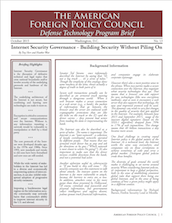
Internet Security Governance covers the policy challenges that arise from building and governing security in the Internet’s architecture and key protocols. It is not a description of security for computers and networks (Information Assurance), how to manage the negotiated structure and key functions of the Internet (Internet Governance), or the pursuit of criminal groups and other threat actors (Cyber Crime). Internet Security Governance is the discussion of defensively oriented technical and legal topics that cross national boundaries and/or involve security of the underlying protocols and hardware which make up the Internet...
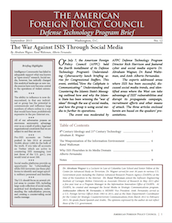
On July 7, the American Foreign Policy Council (AFPC) held the fourth installment of its Defense Technology Program’s Understanding Cybersecurity lunch briefing series for Congressional Staffers. This event, entitled, “How the Caliphate is Communicating:” Understanding and Countering the Islamic State’s Messaging outlined how and why the Islamic State has been winning the “war of ideas” through the use of social media, and how the group is using social media to further its operations...
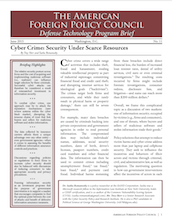
Cyber crime covers a wide range of activities that includes theft, fraud and harassment; stealing valuable intellectual property as part of industrial espionage; committing financial fraud and credit card theft; and disrupting internet services for ideological goals (“hacktivism”). The crimes target both firms and consumers, and while they rarely result in physical harm or property damage, there can still be severe consequences...
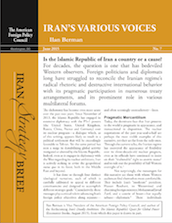
Is the Islamic Republic of Iran a country or a cause? For decades, the question is one that has bedeviled Western observers. Foreign politicians and diplomats long have struggled to reconcile the Iranian regime’s radical rhetoric and destructive international behavior with its pragmatic participation in numerous treaty arrangements, and its prominent role in various multilateral forums.
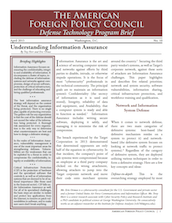
Information Assurance is the art and science of securing computer systems and networks against efforts by third parties to disable, intrude, or otherwise impede operations. It is the focus of most “cybersecurity” professionals in the technical community. The principal goals are to maintain an information system’s Confidentiality (the secrecy of information as it is used and stored), Integrity, reliability of data and equipment, and Availability, that a computer system is ready and able to function as needed. Information Assurance includes writing secure software, deploying it safely, and managing it to minimize the risk of compromise.
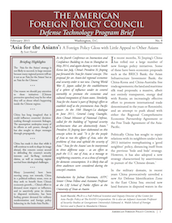
In recent months, Xi Jinping’s China has rolled out a large number of new foreign policy initiatives. Some of these have been economic proposals such as the BRICS Bank; the Asian Infrastructure Investment Bank; the China-Korea and China-Australia free trade agreements; the land and maritime silk road proposals; a massive, albeit not entirely transparent, energy deal with Russia; an increasingly effective effort to promote international trade denominated in the yuan or Renminbi; and an attempt to push ahead with either the Regional Comprehensive Economic Partnership Agreement or the Free Trade Agreement of the Asia-Pacific.
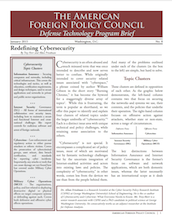
Cybersecurity is an often abused and much misused term that was once intended to describe and now serves better to confuse. While originally intended to cover security related issues associated with “cyberspace,” a phrase coined by author William Gibson in the short story “Burning Chrome,” it has become the byword for a staggeringly diverse array of topics. While this is frustrating, the term is popular as shorthand, so we offer this paper to identify and explain four clusters of related topics under the larger umbrella of “cybersecurity.” Each is a distinct issue area with unique technical and policy challenges, while retaining some association to the others...
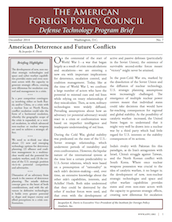
On the centennial of the start of World War I—a war that began largely as a result of crisis miscalculations and escalations—we are entering a new era with important implications for deterrence, escalation control, and coalition management. Today, like at the time of World War I, we confront a large number of actors who have the potential to misread cues and red lines while relying on treaty relationships if they miscalculate. Then, as now, military technologies were widely diffused. Prevailing assumptions about how an adversary (or potential adversary) would react in a crisis or confrontation were based on imperfect intelligence and inadequate understanding of red lines...
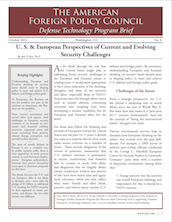
As we think through the role that the United States might play in addressing future security challenges in the European and Eurasian arenas in coming years, it would seem appropriate to have some indication of the thinking, thoughts, and ideas of our partners and allies—especially those in NATO. Americans may feel strongly about issues such as missile defense, countering terrorism and stopping Iran from developing a nuclear capability, but do European and Eurasian allies feel the same?...
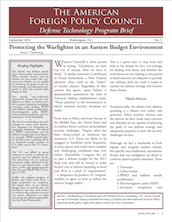
Winston Churchill is often quoted as saying, “Gentlemen, we have run out of money. Now we have to think.” A similar statement is attributed to Ernest Rutherford, a New Zealand physicist often cited as the “father” of nuclear physics. Regardless of who uttered this quote, many believe it appropriately summarizes the state of America’s defense establishment today. “Fiscal austerity” is the environment in which national security decisions are made...
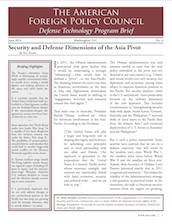
There is no question that the United States faces significant and increasing security challenges in the Asia-Pacific region, including the growing threat posed by ballistic missiles and their payloads. It is fair to argue that China is increasingly confident and assertive in addressing its perceived national interests, supported by its expanding military might and power projection capabilities. From appearances, it is also reasonable to assert that North Korea is not on a path to openness, reform, and reconciliation with its neighbors. As such, it is critical that the United States provide for its national defense in the Pacific...
The problem. The U.S. government is demonstrably unable to protect the classified information on which much of national security is based. In the Manning and Snowden era when possibly two million classified documents are made public and the press is awarded prizes for publishing much of the stolen material, it is fair to ask whether the government is capable of protecting the information required for effective intelligence, military, and diplomatic results. As internet‐age leakers are outpacing spies as insider threats, it would appear that the paradigm to protect classified information is fundamentally broken, and it is time to consider what it might take to fix it. Or if the paradigm is truly beyond repair, what should replace it?
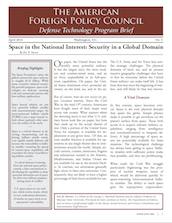
Space as a domain and the systems that use it are integrated with American power, whether the soft power of culture, reputation, diplomacy and economics or the hard power of armed force. For that reason, it is no longer possible to stovepipe strategic thinking about space and national security. Developments in one area directly affect others. From civil space programs that help shape foreign spending on space and trade arrangements that impact access to space and have diplomatic consequence to military systems that civilian users have come to rely upon, policymakers must approach developments in space as an integrated whole, a single phenomenon that requires expertise across the range of space activities.
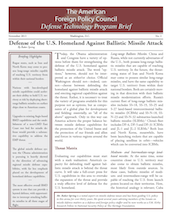
Today, the Obama administration and Congress have a variety of options before them for strengthening the defense of the U.S. homeland against ballistic missile attack. The word “options,” however, should not be interpreted as an either/or choice. Official Washington should not—indeed, cannot choose between defending the homeland against ballistic missile attack and erecting regional capabilities against the threat. Rather, it is necessary to treat the variety of programs available for this purpose not as options, but as components of a global plan for development and fielding: essentially, an “all of the above” approach. Only in this way can America achieve the proper balance between missile defense capabilities for the protection of the United States and the protection of our friends and allies and forces in various regions around the world...
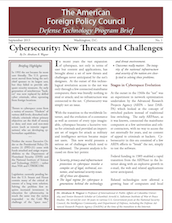
In recent years the vast expansion of cyberspace, not only in terms of user but content and applications, has brought about a set of new threats and challenges never anticipated by the net’s designers. At the outset of this technological revolution access to the net was only through a few connected mainframe computers; there was literally nothing to steal or attack; and no infrastructure was connected to the net. Cybersecurity was simply not an issue...
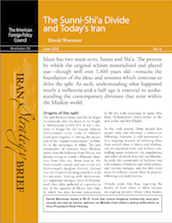
Islam has two main sects, Sunni and Shi’a. The process by which the original schism materialized and played out—though well over 1,400 years old—remains the foundation of the ideas and tensions which continue to drive the split. As such, understanding what happened nearly a millennia-and-a-half ago is essential to understanding the contemporary divisions that exist within the Muslim world.
There has been much talk about the “pivot to Asia” as if it is something novel or new. In truth, however, U.S. foreign policy has been engaged in a pivot to Asia ever since Commodore Perry sailed under orders given to him by President Millard Fillmore in 1853 to open up Japan. Missing in the current approach, however, has been discussion about South Asia, except when South Asian states (namely Pakistan, India, Nepal, and Bangladesh) intersect with issues related to Central Asia and the war in Afghanistan.
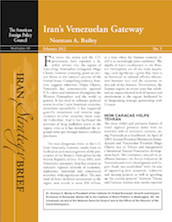
For years, the media and the U.S. government have repeated a familiar refrain: that the regime of now-ailing Venezuelan strongman Hugo Chavez, however annoying, poses no serious threat to the national security of the United States. Compelling evidence, however, suggests otherwise. Under Chavez, Venezuela has systematically opposed U.S. values and initiatives throughout the Western Hemisphere and the world in general. It has tried to influence political events in other Latin American countries, sometimes successfully. It has supported guerrilla movements and terrorist organizations in other countries (most notably Colombia). And it has facilitated the activities of drug traffickers active in the region, even as it has destabilized the regional status quo through massive military purchases.
The most dangerous threat to the U.S. from Venezuela, however, results from its facilitation and encouragement of the penetration of the Western Hemisphere by the Islamic Republic of Iran. Since 2005, with Venezuela’s assistance, Iran has created an extensive regional network of economic, diplomatic, industrial and commercial activities, with significant effect. The sum total of Iran’s declared investments in the region now stands at some $20 billion, at a time when the Iranian economy itself is in exceedingly poor condition. The depths of Iran’s involvement in the Western Hemisphere are all the more surprising—and significant—given that there is no historical or cultural affinity whatsoever between Iran and the countries on this side of the Atlantic. Nevertheless, the Iranian regime in recent years has exhibited an unprecedented level of interest and involvement in the region, facilitated by its burgeoning strategic partnership with Caracas.
A year after the attacks of September 11th, then-Deputy Secretary of State Richard Armitage, in contextualizing the terrorist threat facing the country, made a telling assessment. “Hezbollah may be the A-team of terrorists,” Mr. Armitage told an audience at the United States Institute of Peace in Washington, DC, “and maybe al-Qaida is actually the B-team.” The description was apt, and remains so. With a presence in an estimated forty countries on five different continents, the Lebanese Shi’ite militia represents one of the very few terrorist groups active today that possess a truly global presence and reach.
This footprint extends not only to the greater Middle East and Europe, but to the Western Hemisphere as well. Over the past quarter-century, Hezbollah has devoted considerable energy and resources to establishing an extensive network of operations throughout the Americas. Today, its web of activity in our hemisphere stretches from Canada to Argentina, and encompasses a wide range of illicit activities and criminal enterprises, from drug trafficking to recruitment to fundraising and training.
America's strategy toward Iran is faltering. Nearly seven years after the disclosure of the Iranian regime’s nuclear program, and a year-and-a-half after the start of “engagement” on the part of the Obama administration, Washington has yet to see a substantive diplomatic breakthrough in the deepening international impasse over the Iranian regime’s nuclear ambitions. To the contrary, mounting evidence suggests that Iran’s rulers have used the strategic pause aff orded by American outreach to forge ahead with their nuclear endeavor, adding permanence to Iran’s increasingly mature and menacing atomic effort.
Multilateral eff orts at sanctions, meanwhile, have failed to keep pace with these advances. Between 2006 and 2008, three rounds of international sanctions were authorized and enacted by the United Nations Security Council, with little perceivable impact on Iran’s nuclear decisionmaking. A fourth round of sanctions has just been finalized by the United States and other Permanent Security Council members. Yet already, there are clear signs that this effort, like its predecessors, will fall far short of applying the broad, comprehensive economic pressure necessary for Iran to begin to rethink its nuclear drive.
As a result, the United States and its allies in the international community will soon be confronted by the stark binary choice best outlined by French President Nicolas Sarkozy several years ago: an Iran with the bomb, or the bombing of Iran. If it hopes to avoid such a state of affairs, the United States will need to marshal a comprehensive economic warfare strategy toward the Islamic Republic — one that leverages the latent vulnerabilities inherent in the Iranian economy to ratchet up the cost of the regime’s nuclear endeavor. Such an approach starts by focusing on six discrete areas of economic activity that could be used to alter the Iranian regime’s behavior.
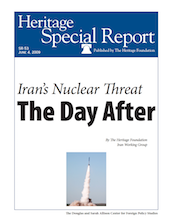
Iran is on the brink of attaining a nuclear weapons capability. The U.S. should immediately put in place the foundations of a strategy to dissuade Tehran from attaining a nuclear weapon through diplomacy, disarm it through military force, or establish a robust framework of augmented deterrence to mitigate the threat posed by a nuclear Iran and prevent a future disaster from unfolding.
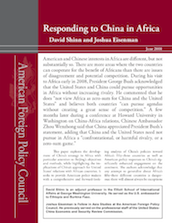
American and Chinese interests in Africa are different, but not substantially so. There are more areas where the two countries can cooperate for the benefit of Africans than there are issues of disagreement and potential competition. During his visit to Africa early in 2008, President George Bush acknowledged that the United States and China could pursue opportunities in Africa without increasing rivalry. He commented that he does “not view Africa as zero-sum for China and the United States” and believes both countries “can pursue agendas without creating a great sense of competition.” A few months later during a conference at Howard University in Washington on China-Africa relations, Chinese Ambassador Zhou Wenzhong said that China appreciated President Bush’s statement, adding that China and the United States need not pursue in Africa a “confrontational, or harmful rivalry, or a zero-sum game.”
What can the United States do about Iran? Today that question, fueled by growing international concern over the Islamic Republic’s persistent nuclear ambitions, has emerged at the forefront of the American strategic debate.
In this calculus, economic measures have received comparatively short shrift. This is because conventional wisdom has it that the United States possesses little leverage that it can bring to bear in order to deter and contain Iran’s nuclear ambitions. In this case, however, the conventional wisdom is wrong; the United States has a considerable number of economic tools at its disposal, despite its lack of trade relations with the Islamic Republic.
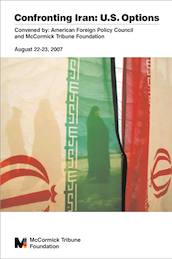
Today, the Islamic Republic of Iran looms large on the agenda of policymakers in Washington. Over the past several years, it has become clear that the Islamic Republic is pursuing a massive, multifaceted endeavor to acquire a nuclear capability—and that it is making rapid progress toward this goal, despite pressure from the world community. Yet Iran’s nuclear program is just part of a larger picture. The Islamic Republic’s enduring support for terrorism, its growing and pernicious regional role, and its radical, uncompromising ideology currently also pose serious challenges to the United States, its allies and American interests in the greater Middle East.
So far, policymakers in Washington have failed to muster an adequate response on any of these fronts. As a result, the Islamic Republic has gained precious time to entrench itself in Iraq, expand its support for terrorists and bring added permanence to its nuclear effort. The logical conclusion of the current status quo is a mature Iranian nuclear capability, continued Coalition casualties in Iraq, and emboldened terrorist groups across the region. If it hopes to avoid such an outcome, the United States must harness all the elements of national power into a strategy that focuses on three concrete goals vis-à-vis Iran: counterproliferation, counterterrorism, and counterinsurgency.
While there is still hope that Iran will not develop nuclear weapons, it is becoming more likely that a nucleararmed Iran will become a reality in the near future. It therefore is useful to begin looking at strategic models for managing the threat of nuclear weapons if Iran actually develops them, and to consider exactly what risks the civilized world would be facing.
Who is Mahmoud Ahmadinejad? Before his meteoric rise to power in the summer of 2005, Iran’s ultra-conservative president was a relative political unknown. Since taking office in August 2005, however, the 50-year-old Ahmadinejad has done much to demonstrate his radical credentials. He has ratcheted up the Islamic Republic’s hostile rhetoric toward Israel and the United States. His government has systematically rolled back domestic freedoms and deepened its control over Iranian society. And, under his direction, the Islamic Republic has accelerated its very public march toward an atomic capability.
AFPC Senior Fellow Dr. Elie Krakowski is now completing a year-long project on American policy options in Afghanistan. Dr. Krakowski’s analysis explores problems facing the U.S. in the course of our war on terrorism. These include the prospect of mounting regional instability and the possible breakup of Pakistan as a nation.